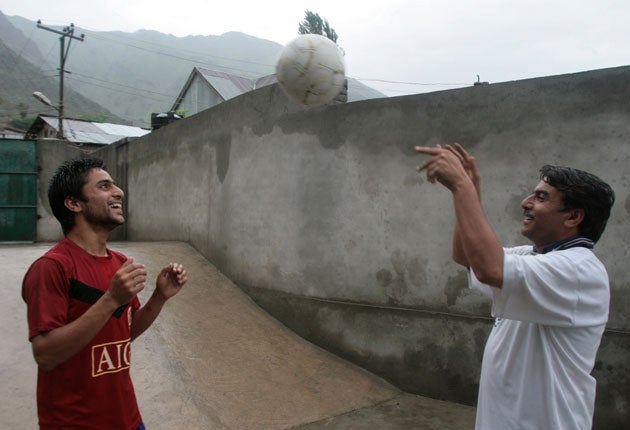Kashmiri star will finally get to the ball
Father's youthful militancy delayed promising son's chances in Brazil

History hangs in the air in Kashmir, as thick and unshifting as the mist that twists itself around the hills, as the teenage Basharat Bashir demonstrates his skill with a football.
By any reckoning, the slightly built 19-year-old is one of the most promising players to have emerged in the state in recent years. Indeed, his coach – an Argentinian called Juan Marcos Troia – had lined up overseas opportunities for him: first in Spain and then in Brazil, where he was to have joined Santos FC, the club at which the mighty Pele displayed his mesmerising talent for nearly two decades.
But when Basharat applied for a passport to embark on his bright new future, the past reached to hold him back – not his past, but that of his father, Ahmad. "The authorities told me there was a problem with my father," said Basharat, a fan of both Manchester United and the Portuguese star Cristiano Ronaldo.
When the teenager returned to the family home on the outskirts of Srinagar in Indian-administered Kashmir and confronted his parents, his father was forced to reveal to him that 20 years ago – when he was not much older than Basharat is now – he had joined up with anti-India militants in Pakistan-administered Kashmir for 18 months of military training. When he returned to Indian Kashmir, he spent almost four years underground before being captured by the security forces and jailed. "I was involved in the militancy. Why I was is another matter. I have done whatever I have done, but they are punishing my son," said Mr Bashir, who, two decades on, is now a middle-class businessman dealing with heavy machinery who long ago turned his back on the militancy.
The story of Basharat and his father is a snapshot of life in Kashmir, a portrait-in-miniature of a place where the impact of a decision taken more than 60 years ago – when Kashmir's Hindu maharajah, Hari Singh, decided to join India rather than the newly created Pakistan – continues to reverberate.
It is also a story that is utterly up-to-date; this summer, as protesters took to the streets in breach of curfews and demonstrated against Indian rule, Basharat has again had cause to reflect on his father's actions. When his passport application failed, he was furious, punching the doors and walls of his home. What made matters worse, was that two of his friends, Musadiq Mehraj and Hanan Mir, who had also been offered footballing opportunities in Brazil, had successfully obtained their passports.
Yet, quietly, the teenager also felt a sense of pride that his father had fought for a cause with which he could sympathise. In recent weeks, as more than 60 people have been killed by the security forces in Kashmir's largest towns, Basharat might, under different circumstances, have been tempted to join the protesters. He also discovered he was far from alone in his plight; when he was turned down for his passport, he met a young Kashmiri who had been offered a place to study in the UK, only to be told that due to his father's militant history, he, too, would not be eligible.
Mr Bashir said, if anything, the anger of Kashmir's youth today is worse than when he joined insurgents in 1987. Then, he had been beaten and jailed by police for being a member of the Muslim United Front, an opposition party that had contested elections widely considered to have been rigged by the authorities. "I was able to enjoy life up until the age of 20 [when the militancy increased and the authorities responded by dispatching tens of thousands of extra troops]. My son has grown up not knowing the good things, only knowing problems," he added. "The parents, like me, are saying, 'Don't go to the streets and protest.' But the kids are saying, 'Why are you saying this?' They are angry not just with India, but also with their parents."
The delay in obtaining his passport has put Basharat's footballing career back several years. Mr Troia, who spent 10 years coaching football in Delhi before moving to Kashmir three years ago, said that by the age of 19 or 20 a young player should be signed by a professional club if they hope to make the most of their talent. "He has been delayed a lot," said the coach.
Yet amid the gloom, there is some hope. After Basharat's problem was highlighted by the local media, the state's chief minister, Omar Abdullah, stepped in to ensure the young striker received the police security clearance he required. He received his navy-blue Indian passport last year, albeit too late for the cut-off date imposed by Brazilian clubs.
Now, Mr Troia is busy contacting teams in Brazil again, trying to arrange a place for Basharat to take up this coming season. He says he is doing "everything he can", as he believes his protégé's career cannot afford to be held back any longer. He added: "The situation here is not good... But the football talent is good."
Join our commenting forum
Join thought-provoking conversations, follow other Independent readers and see their replies
Comments